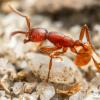There are a lot of rumors on this forum about how Camponotus colonies tend to die out after 2 years. Since I have 3 successful 2 year old colonies I'm a little concerned. 1 of my Camponotus pennsylvanicus queens has stopped laying... the other is doing excellent. My Camponotus discolor ants are thriving, so are the nicos.
Do I need to get them some bird poop suplements?
I live on the top story of a co-op in NYC so getting bird poop isn't a problem. I have gloves and a mask. But I have not done this since the one think *I* know about bird poop is it is full of parasites.
So, I've been thinking... maybe get some and freeze it for a week. Or better yet bake it wrapped in tinfoil.
but could doing that destroy the nutrients needed by the ants?
I think I may offer it to the colony with the queen who has stopped laying first. Test out if it matters.
Of course the queen could have stopped laying for any number of reasons. I'm glad I decided to get two campnotus pennsylvanicus queens from the start. I know this is a project with a failure rate. But if I can get the colony big enough I hope I can get it to last for many years. That's my main goal.


















